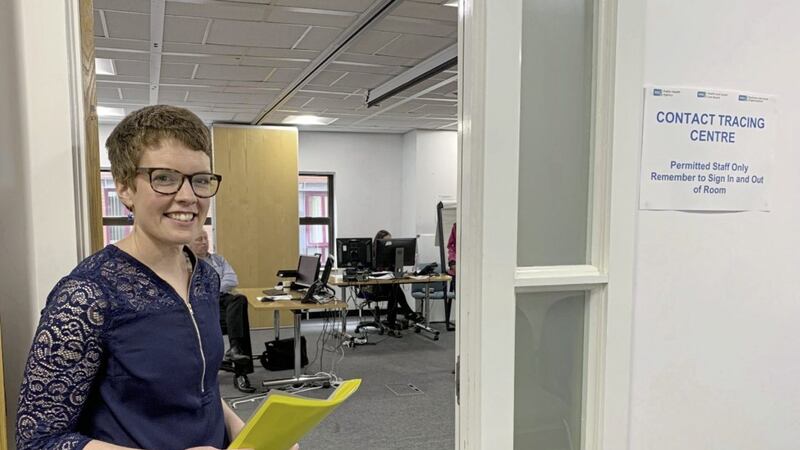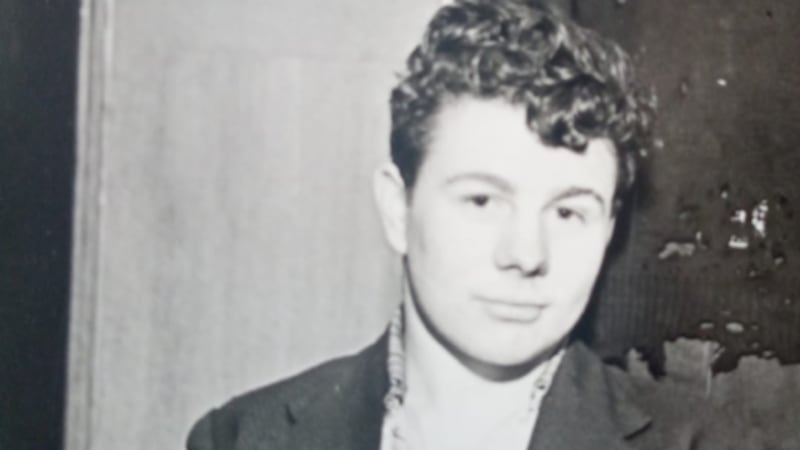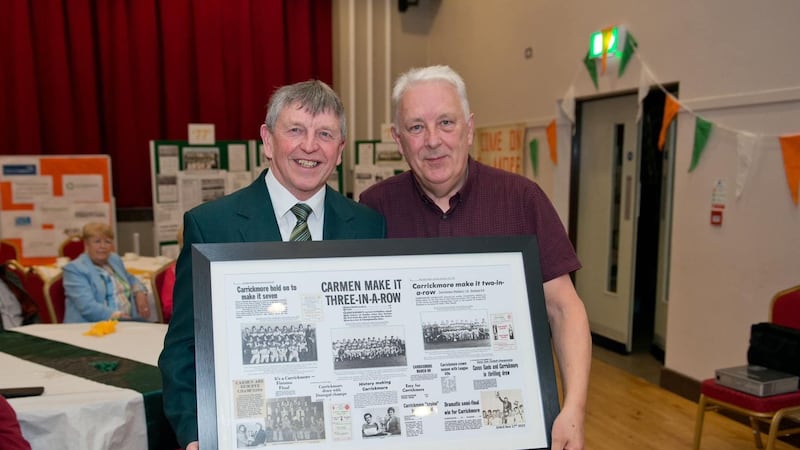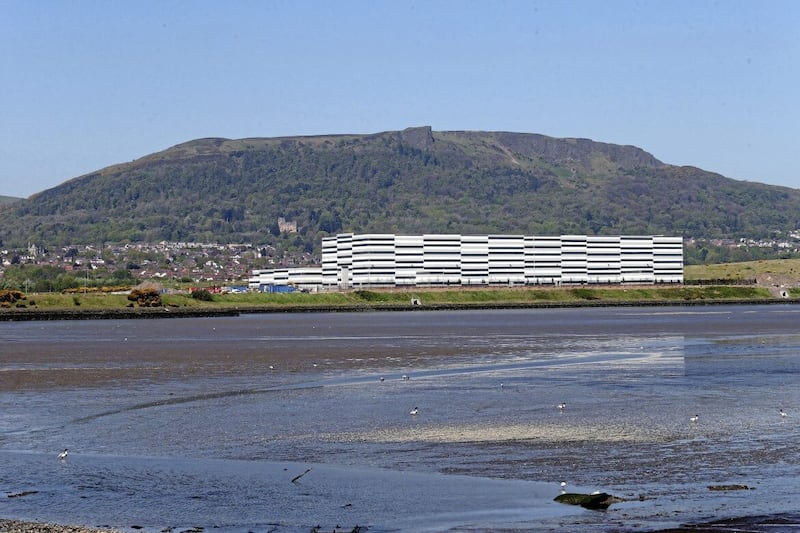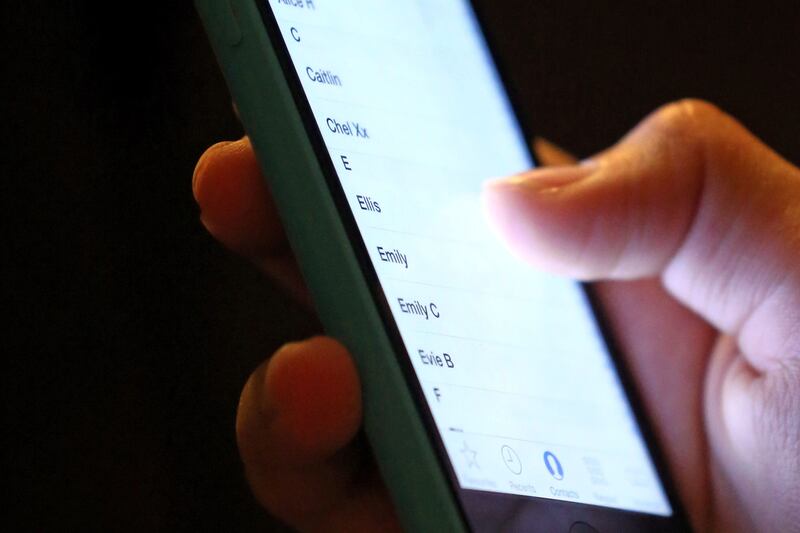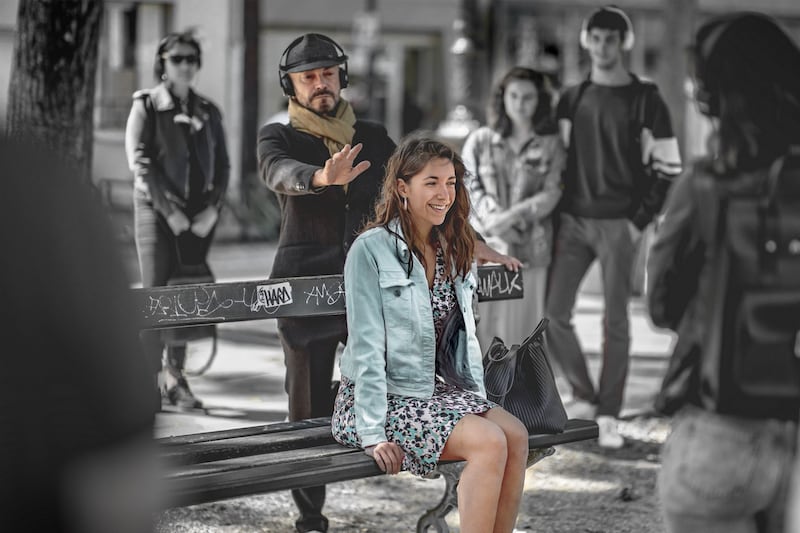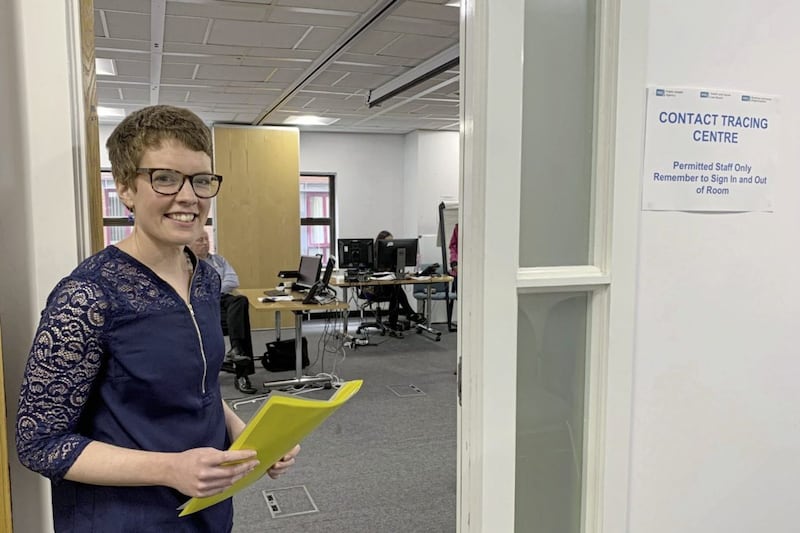"EVERYONE thinks it's going to be all high-tech up here. It really isn't."
The Public Health Agency is keen to manage our expectations as we begin our socially distant ascent up the fire escape stairs to the second floor of its Linenhall Street building, in Belfast city centre.
In the era of 2m separation, this is a command centre so of course the lifts will only permit two people at a time, with two sets of feet helpfully stencilled at opposite corners.
With wide corridors and vast office spaces the building's layout could have been designed for pandemic-working, an impression reinforced by the reduction in staff to an absolute minimum.
The control room is behind a firmly closed door. Although the `tracers' side of the call is unlikely to reveal any personal details, the team is scrupulous about maintaining confidentiality and we are only allowed to step inside when all conversations have been completed.
The grandly named `Contact Tracing Centre' is as low key as we have been warned. Just another anodyne civil service room, its ceiling riven with runners allowing the space to be divided or expanded as needed and `concealed' power sockets pockmarking the functional grey carpet.
What at first appears the slightly odd formation of a handful of utilitarian desks around the room, on reflection is the efficient use of space to allow their occupants to enter and leave without passing too closely to each other.
It says much for the importance of the work that most of those inside the room have actually volunteered to be in this unprepossessing call centre.
The first contact tracing centre to be in place in the UK, this is the new frontline in the fight against the deadly Covid-19, a precision tool deployed as the wave of hospital admissions and deaths have declined. If a second peak is to be flattened, it will be in no small part due to the the vital calls being made from these black desk phones and the data collated on the computer screens beside them.
There are six to eight tracers working Monday to Friday and also a smaller presence at the week. A deep clean is carried out of the room and equipment between shifts.
Each shift has an administration manager - who identifies cases, gathers details and opens files for tracers to work on - and a clinical lead.
Today the clinical lead is a grey-haired former doctor who has answered Health Minister Robin Swann's call to come out of retirement to volunteer his expertise.
Some have worked in the centre since the pilot which saw the tracing of those who had contact with people who tested positive in nursing homes.
By the first week in June, the PHA had trained 82 people for the roles, from a range of backgrounds including their own nursing and `health improvement' staff, RQIA bank inspectors, nurses and environmental health officers.
Karen Lusk is the day's administrative manager and worked on the initial programme in February, when it was still hoped that the coronavirus could be containable and only those who had caught it abroad were falling ill. When that proved to be a forlorn hope and `community transmission' began it was wound up and attention switched to treatment while the population was locked down.
Carole McCorry's day job was training nurses. She's finding the change of role an interesting one "being able to support patients at the other of the line".
Calls are made to people who have tested positive and trying to get a list of who they have been in close contact with during their infectious period and the contact details.
Those `close contacts' (people who have been within two metres for 15 minutes or longer; coughing somewhere nearby or in direct physical contact) then receive a phone call - the number may come up as `withheld' - and if they do not have any symptoms they are told to self isolate for 14 days.
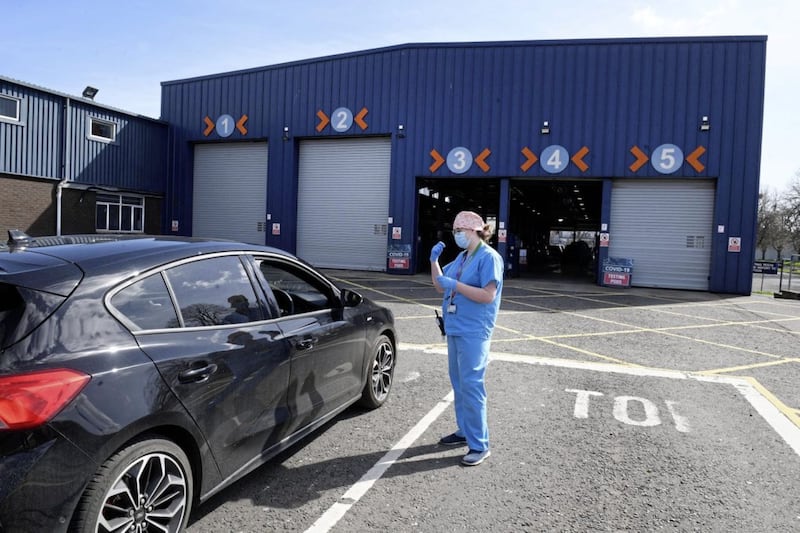
If they have symptoms of a high temperature, a new, continuous cough and or a loss or change to sense of smell or taste, the instruction is isolation from the day they started to feel unwell.
Dr Sarah Milligan, one of the Public Health registrars overseeing the project, explains that like any other disease, it is all about when people are infectious - in this case "from 48 hours before and up to seven days after" symptoms present themselves.
If the asymptomatic get symptoms during the 14 day isolation period the clock starts on their seven day self isolation from then and they are advised to get tested to confirm they have Covid-19.
They are not required to withdraw completely from contact in their household.
"The majority are very compliant, there is very very little challenge," Carole McCorry says. "They seem to understand the purpose and need for isolation or restricting movements."
That is reassuring for those in charge of efforts to surpress Covid-19 as they can only offer `advice', not compel anyone to withdraw from further interaction with other people while they are likely infectious.
"It's working really well," Dr Milligan says. "We're lucky here that its a small country anyway."
It is not the doctor's first rodeo, her job at the PHA involves managing infections such as meningitis and scarlet fever with similar contact tracing and advice.
"The general principle would apply to any type of infections, although we wouldn't normally need this centre."
The virulence of Covid-19 has made this an operation unlike anything experienced before.
"This is brand new to us all and we all have to adjust and think quickly. It has certainly been a really challenging time."
A further 20 tracers are in training and as it transitions from the pilot programme to a dedicated COVID-19 contact tracing operation, many of the current crop of tracers will return to their mothballed day jobs (or retirement).
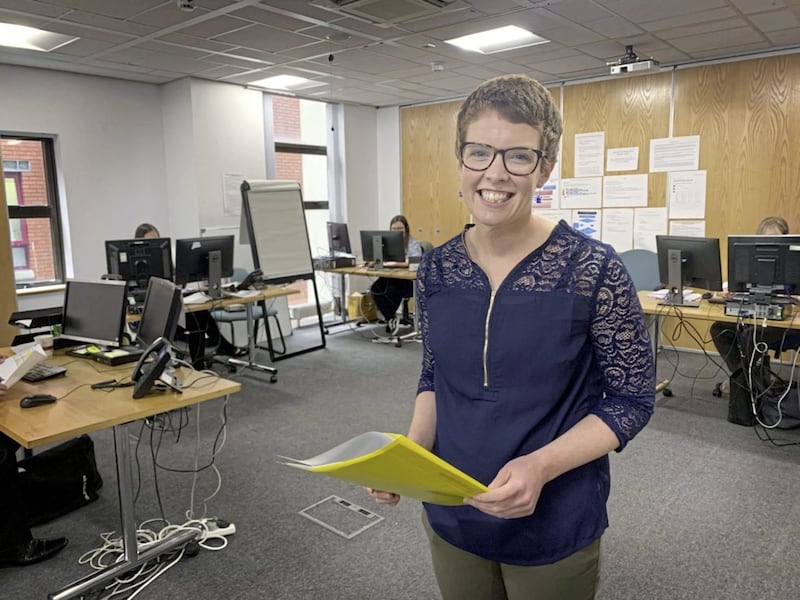
The full-time roles needed for the new service have already been advertised, with staff being recruited on contracts "for at least one year". The option is there for an extension - First Minister Arlene Foster has indicated it could be up to two years before the disease is under control in Northern Ireland.
The PHA envisions at least 20 staff working in shifts to trace the contacts of cases as access to testing increases in coming weeks and the number of positive cases rises.
Everyone over the age of five years with symptoms of Covid-19 is now eligible for testing, which can be booked directly at nhs.uk/coronavirus or by ringing 119.
People with symptoms can be tested at one of the four drive through test centres in Belfast, Derry, Craigavon, or Enniskillen, or via a postal self-test kit sent to their home.
The plan is to have a contract tracing programme "based on need" which can be scaled up and down at short notice in line with demand, and Health Minister Robin Swann has indicated there will be a digital (app) component at some stage.
After the accusations of government data-mining which accompanied England and Wales's app, the PHA is anxious not to scare the horses and stresses any such effort will be developed "to complement the telephone-based contact tracing".
Mr Swann told the Stormont scrutiny committee that he will not encourage people to download Westminster's contact-tracing app and it is "not compulsory".
He said work is ongoing for "a Northern Ireland version" - the first devolved administration to do so - which is necessary to ensure it works with the one being developed in the Republic.
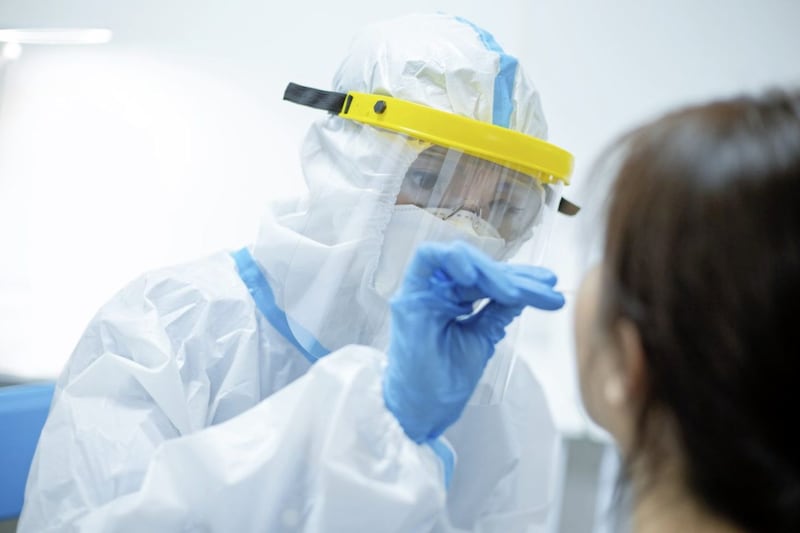
The south has indicated it will use a decentralised model for its app, with checks to see who might be at risk taking place on each user's device.
"This service will still continue," Dr Milligan stresses.
"An app will need people to sign up an need people putting data in to see, if they are positive, where they were. It's another form of doing what we are doing here."
The limited number of possible contacts - due to three months of lockdown restrictions - means the present rate of spread is traceable from the centre.
"At present it's still likely to be people that you know and the person who has tested positive is likely to have told the person and they are probably expecting the call.
"We still need to keep our distance. It is still really important. Covid-19 is still there."
As restrictions lift, the number of contacts each case has will inevitably rise, with enough new staff being recruited to ensure a core of 20 people on shift at any one time.
The staff will have specific skills and experience, such as public health nurses and environmental health officers, with an additional 20 nurses already registered as `bank nurses' having expressed interest in supporting the work who can "supplement or complement the contact tracing service as required".
But Dr Milligan is clear that the centre is "just one part of how we're all going to pull together".
"We still have to keep our distance, wash our hands and avoid touching our faces. There is no single answer and we don't want any complacency around this.
"Everything really depends on how people are behaving."
FACTFILE: Between May 19 and June 6 2020)
Total number of successful telephone encounters with cases of COVID-19 = 480
Total number of successful telephone encounters with contacts of confirmed cases= 721
Further information on COVID-19 (coronavirus) at www.pha.site/coronavirus
